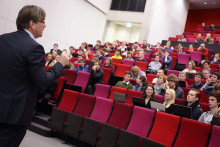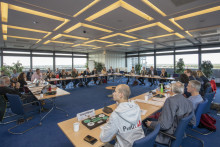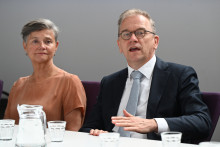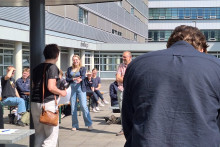‘The surface tension of water has enough force to fold a microchip into a box,’ explained Sundaram in the Waaier cafeteria. ‘It’s astonishing that a single drop of water can actually do that.’ Sundaram became a UT student in 2000 and plans to graduate with a masters in electrical engineering in June from the Transducers Science and Technology Group which is part of the MESA+ Research Institute.
His project has a number of potential applications. For example, medicine can be placed into the folded microchip and then taken by the patient. When it reaches the right location in the body, the box can then be electronically opened and the dosage released to allow for lower side effects. These origami-like structures could also be used as small electronic sensors to measure movement in three dimensions, similar to the two-dimensional sensors found in iPods that rotate the web screen as you turn the device or act as a compass.
‘The most difficult part was placing the water on the structure,’ said Sundaram. ‘You can just imagine trying to position a drop of water on a structure only 150 micrometers in width without breaking it when you can barely see it with your naked eye!’ Besides actually accomplishing this feat, Sundaram went onto research the folding rate of the silicon structure, which included comparing different widths and stiffness of the folding hinges, the contact angles of the water, and the coating thicknesses of Fluor Carbon. ‘What was really striking,’ said Sundaram, ‘was our theoretical models and experimental values correlated completely.’
Besides his research work, Sundaram runs his own company, 123Telcom (www.123telcom.nl), which employs eight people and specializes in telecommunication solutions for businesses. He is a Tamil and was born in northern Sri Lanka, but when he was five, his parents became refugees of the civil war and took asylum in the Netherlands. The civil war ended only last year after 26 years during which the Liberation Tigers of Tamil Eeelam struggled for equal rights or an independent state. ‘War is over, thank God,’ said Sundaram, ‘but I think it should have been over ten years ago. The politicians are to blame for it lasting so long. There was a lot of corruption and money made from this war.’
When asked about the recent parliamentary elections that consolidated President Mahinda Rajapaksa’s power and his pledge that all Sri Lankans are ‘children of the same mother,’ Sundaram didn’t hesitate. ‘Democracy only brought us corruption and lying politicians. We Sri Lankans keep asking, “When will we get real rulers who care about the people? Real rulers who care about the country?”’
Despite Sundaram’s feelings about Sri Lanka’s politicians, he actually is a Council member of the municipality of Enschede. ‘I’m more tuned into the hypocrisy in politics,’ he said. ‘I can see the wrongs. That gives me energy to organize institutions to function as they should.’
When asked if he feels more Tamil or Dutch, he replied honestly, ‘I struggled with this question of identity a lot in my teens. But in the end my fiancée really helped me to realize that deep down I am Tamil. We have a culture of selflessness and are taught to be in service to others. This is a big contrast to Dutch culture with is more individualistic.’ Sundaram will marry Aruna Tharmakulanathan, 25, in July. She is also a Tamil who fled as a child with her family to Sweden.
‘The Dutch say they are progressive,’ Sundaram reflected. ‘But the reality is different. Obama can happen in the US. But Obama can’t happen here. The good thing about the Netherlands is everything is discussable. I can be critical and say what I want without insulting anyone.’
 |
| Sundaram plans to devote himself to politics and his telecommunications company after graduating in June. (Photo: Gijs van Ouwerkerk) |







